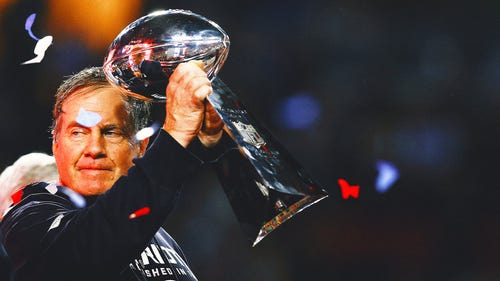
Column: Spring football could work, but XFL2 not the answer
Vince McMahon is resuscitating the XFL.
OK, let's get the bad jokes out of the way: Are some teams going to be wearing masks and representing parts unknown? Will the hook-and-ladder play involve smashing someone with a real ladder?
The XFL was a ''colossal failure'' the first time McMahon tried it - his words - and there's every reason to believe XFL2 will meet a similar fate.
But a spring football league, done the right way, could work.
And, no, we're not kidding around.
The United States Football League came up with the most feasible concept back in the 1980s, only to crumble after just three seasons because of out-of-control spending and a suicidal push by owners such as Donald Trump to compete directly against the NFL .
But the USFL might still be around today if it had stuck to its original concept, which was to serve as more of a complement to the NFL than a direct competitor.
The timing is ripe for another attempt.
While the economy is booming and football remains the nation's most popular sport, the NFL is contending with shrinking TV ratings, empty seats and a lingering debate over players kneeling during the national anthem to protest social injustice. For the first time in decades, there are actually some cracks in the league's armor.
Clearly, those issues figured into McMahon's planned re-launch of the XFL in 2020 .
''As far as this league is concerned, it will have nothing to do with politics, nothing to do with social issues,'' he said. ''That's what the fans want. When they tune in to a game, they don't want to deal with political issues. They want to watch good football.''
Good football will likely be the fatal flaw in McMahon's new venture, just as it was for the original XFL. While the risque cheerleaders and close ties to wrestling brought plenty of much-deserved ridicule, it was the amateurish quality of play that ultimately caused its downfall. As Bob Costas memorably observed, it was ''mediocre high school football'' combined ''with a tawdry strip club.''
Since McMahon's new XFL will follow the same single-entity plan - he'll be the sole owner of the eight-team league - there's unlikely to be nearly enough money to lure any recognizable names, unless Tim Tebow (yes, he came up during the announcement Thursday) decides to make a football comeback.
But an updated version of the USFL concept would have a real chance at succeeding during the spring and summer, football's traditional offseason.
Here's a few ideas:
- Start with 10 or 12 teams, split between major NFL cities such as New York, Chicago and Los Angeles; those that have lost teams (San Diego, St. Louis and soon-to-be Oakland); and untapped markets with big league stadiums (San Antonio comes to mind).
- Restrict ownership to those who not only have deep pockets, but are totally committed to the concept (i.e., not simply trying to turn their investment into a merger with the NFL). Point out the relative bargain of owning a team in the new league compared to, say, the Carolina Panthers, whose selling price will surely exceed $2 billion. Maybe Mark Cuban would be interested in a Dallas franchise. Reach out to Oprah Winfrey about a Chicago team.
- Don't get into a bidding war with the NFL over players. Focus heavily on scouting and development, which means pursuing lower-level pros who might thrive in a bigger role and college stars projected to go in the later rounds of the NFL draft. Always be on the lookout for someone like 2016 Heisman Trophy winner Lamar Jackson, the subject of wildly varying draft projections, who might have a better chance at playing time in a new league. And let's not forget: Colin Kaepernick is still unemployed.
- Line up a traditional TV deal to provide financial stability, perhaps some combination of a major network and a newer, sports-themed cable outlet such as NBCSN or Fox Sports 1. But also be on the cutting edge of subscription services, mobile streaming and other innovative conduits that appeal to a younger audience.
In essence, follow the model laid out by the late David Dixon, the New Orleans businessman whose longtime push for an out-of-season league finally came to fruition with the launch of the USFL in 1983.
Looking back, that first season was a rousing success in many ways. The Denver Gold averaged more than 41,000 fans. Overall attendance was roughly in line with the hoped-for 25,000 per game. TV ratings on ABC and then-fledgling ESPN actually exceeded projections. The quality of play was solid.
But the seeds of the USFL's downfall were already in motion. When the New Jersey Generals skirted the salary cap to lure Heisman Trophy winner Herschel Walker away from Georgia, it only led more teams to dole out big bucks in pursuit of stars. That, in turn, led to huge financial losses. Dixon wisely walked away after that inaugural season.
In the end, the USFL's most enduring legacy was the $3 judgment it ''won'' in an antitrust suit against the NFL, a ruling that finished off the league in 1986 before it carried out a Trump-backed move from spring to fall.
No one since has made a serious attempt at a spring football league.
A revived XFL certainly doesn't qualify.
But someone out there should heed McMahon's words.
''Football is America's favorite sport,'' he said. ''We've got seven months of no football on the gridiron and 70 million fans. Why not now? Now is the perfect opportunity.''
---
Paul Newberry is a sports columnist for The Associated Press. Write to him at pnewberry(at)ap.org or at www.twitter.com/pnewberry1963 . His work can be found at https://apnews.com/search/paul%20newberry
---
For more AP NFL coverage: www.pro32.ap.org and www.twitter.com/AP-NFL










